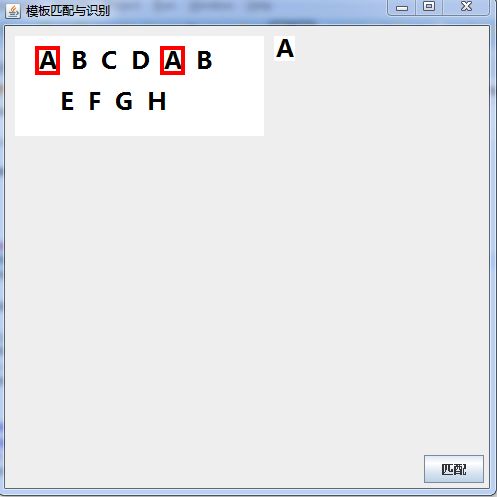图像处理之基于NCC模板匹配识别
一:基本原理
NCC是一种基于统计学计算两组样本数据相关性的算法,其取值范围为[-1, 1]之间,而对图像来说,每个像素点都可以看出是RGB数值,这样整幅图像就可以看成是一个样本数据的集合,如果它有一个子集与另外一个样本数据相互匹配则它的ncc值为1,表示相关性很高,如果是-1则表示完全不相关,基于这个原理,实现图像基于模板匹配识别算法,其中第一步就是要归一化数据,数学公式如下:
二:实现步骤
(1) 获取模板像素并计算均值与标准方差、像素与均值diff数据样本
(2) 根据模板大小,在目标图像上从左到右,从上到下移动窗口,计
算每移动一个像素之后窗口内像素与模板像素的ncc值,与阈值比较,大于
阈值则记录位置
(3) 根据得到位置信息,使用红色矩形标记出模板匹配识别结果。
(4) UI显示结果
三:编程实现
基于JAVA语言完成了整个算法编程实现与演示,其中第一步的代码如下:
int tw = template.getWidth();
int th = template.getHeight();
int[] tpixels = new int[tw * th];
getRGB(template, 0, 0, tw, th, tpixels);
for(int i=0; i<tpixels.length; i++)
{
tpixels[i] = (tpixels[i] >> 16) & 0xff;
}
double[] meansdev = getPixelsMeansAndDev(tpixels);
double[] tDiff = calculateDiff(tpixels, meansdev[0]);
int raidus_width = tw / 2;
int raidus_height = th / 2;第二步的实现代码如下:
int[] windowPixels = new int[tw * th];
Arrays.fill(windowPixels, 0);
for (int row = 0; row < height; row++) {
for (int col = 0; col < width; col++) {
// calculate the means and dev for each window
if(row < raidus_height || (row + raidus_height) >= height)
continue;
if(col < raidus_width || (col + raidus_width) >= width)
continue;
int wrow = 0;
Arrays.fill(windowPixels, 0);
for(int subrow = -raidus_height; subrow <= raidus_height; subrow++ )
{
int wcol = 0;
for(int subcol = -raidus_width; subcol <= raidus_width; subcol++ )
{
if(wrow >= th || wcol >= tw)
{
continue;
}
windowPixels[wrow * tw + wcol] = getPixelValue(width, col + subcol, row + subrow, inPixels);
wcol++;
}
wrow++;
}
// calculate the ncc
double[] _meansDev = getPixelsMeansAndDev(windowPixels);
double[] diff = calculateDiff(windowPixels, _meansDev[0]);
double ncc = calculateNcc(tDiff, diff, _meansDev[1], meansdev[1]);
if(ncc > threhold) {
Point mpoint = new Point();
mpoint.x = col;
mpoint.y = row;
points.add(mpoint);
}
}
}第三步的实现代码如下:
// draw matched template on target image according position
setRGB( dest, 0, 0, width, height, inPixels );
Graphics2D g2d = dest.createGraphics();
g2d.setPaint(Color.RED);
g2d.setStroke(new BasicStroke(4));
for(Point p : points)
{
g2d.drawRect(p.x - raidus_width, p.y - raidus_height, tw, th);
}其中第二步用到的计算NCC的方法实现如下:
private double calculateNcc(double[] tDiff, double[] diff, double dev1, double dev2) {
// TODO Auto-generated method stub
double sum = 0.0d;
double count = diff.length;
for(int i=0; i<diff.length; i++)
{
sum += ((tDiff[i] * diff[i])/(dev1 * dev2));
}
return (sum / count);
}UI部分完整源代码如下:
package com.gloomyfish.image.templae.match;
import java.awt.BorderLayout;
import java.awt.FlowLayout;
import java.awt.Graphics;
import java.awt.Graphics2D;
import java.awt.event.ActionEvent;
import java.awt.event.ActionListener;
import java.awt.image.BufferedImage;
import java.io.IOException;
import javax.imageio.ImageIO;
import javax.swing.JButton;
import javax.swing.JComponent;
import javax.swing.JFrame;
import javax.swing.JPanel;
public class DemoUI extends JComponent {
/**
*
*/
private static final long serialVersionUID = 1L;
private BufferedImage targetImage;
private BufferedImage template;
public DemoUI()
{
super();
java.net.URL imageURL = this.getClass().getResource("words.png");
java.net.URL templateURL = this.getClass().getResource("template.png");
try {
template = ImageIO.read(templateURL);
targetImage = ImageIO.read(imageURL);
} catch (IOException e) {
e.printStackTrace();
}
}
public void setTarget(BufferedImage target) {
this.targetImage = target;
}
@Override
protected void paintComponent(Graphics g) {
Graphics2D g2 = (Graphics2D) g;
if(targetImage != null) {
g2.drawImage(targetImage, 10, 10, targetImage.getWidth(), targetImage.getHeight(), null);
}
if(template != null) {
g2.drawImage(template, 20+targetImage.getWidth(), 10, template.getWidth(), template.getHeight(), null);
}
}
public static void main(String[] args) {
JFrame f = new JFrame("模板匹配与识别");
JButton okBtn = new JButton("匹配");
final DemoUI ui = new DemoUI();
okBtn.addActionListener(new ActionListener() {
@Override
public void actionPerformed(ActionEvent e) {
ui.process();
}
});
JPanel btnPanel = new JPanel();
btnPanel.setLayout(new FlowLayout(FlowLayout.RIGHT));
btnPanel.add(okBtn);
f.getContentPane().add(btnPanel, BorderLayout.SOUTH);
f.getContentPane().add(ui, BorderLayout.CENTER);
f.setSize(500, 500);
f.setDefaultCloseOperation(JFrame.EXIT_ON_CLOSE);
f.setVisible(true);
}
protected void process() {
NccTemplateMatchAlg algo = new NccTemplateMatchAlg(template);
targetImage = algo.filter(targetImage, null);
this.repaint();
}
}
四:程序运行效果如下
PS:博客从10月份开始每月都有多篇相关图像处理文章更新
欢迎大家继续关注

